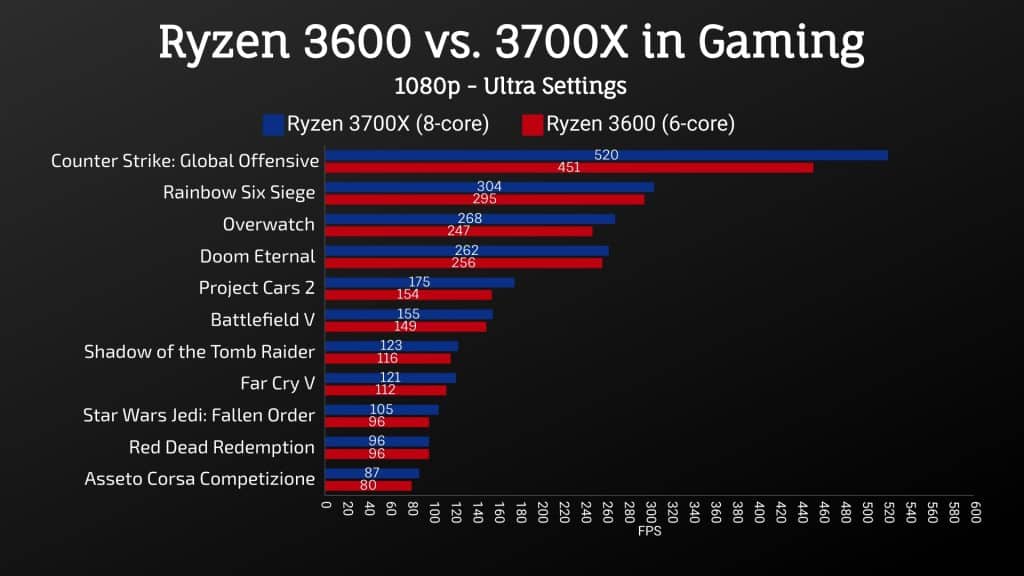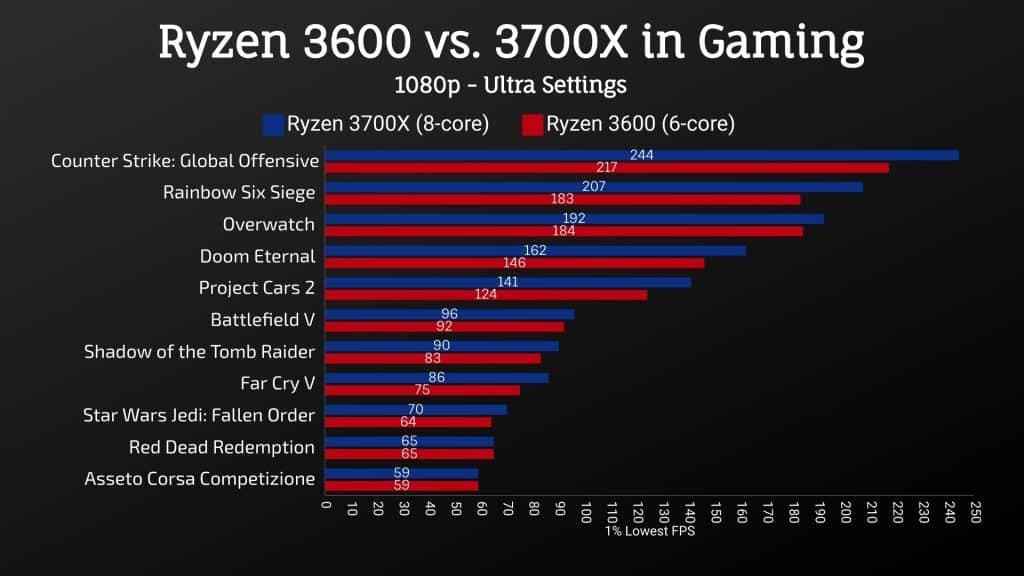6 Core vs. 8 Core CPU for Gaming – Ryzen 3700X vs. 3600
It might be hard to believe that four years ago, the fastest mainstream socket gaming CPU that you could buy was Intel’s quad-core i7 7700K. That was until AMD showed up with the first generation of Ryzen CPUs and illustrated that core count does matter for a smoother gaming experience.
Soon after, Intel also started to increase the number of cores in their CPUs. So, there seems to be a bit of a CPU core count battle happening between Intel and AMD at the moment. Actually, it’s not that much of a battle because AMD is clearly winning in that regard.
Intel is trying their best to follow, and the result is that we end up having 6 & 8 core CPUs, which are now considered mainstream.
I think it’s fairly well established that ten cores and above for gaming won’t give you more FPS in games. But it’s kind of up for debate whether 6 vs. 8 core CPUs are better, strictly for gaming builds.
For example, gamers ask if it’s better to go with an eight-core CPU to future-proof your system? Or, can a six-core CPU bottleneck your system in some games?
Those are the kind of questions that I will be answering in this article. There are a couple of things that prompted this article.
Firstly, I’m seeing many PC builders opt for the eight-core Ryzen 3700X for strictly gaming builds. Secondly, with upcoming CPUs from Intel and AMD this year, there’s no doubt that the marketing behind these processors will place huge importance on total core and thread count.
Ryzen 3700X vs. 3600
To answer, how many CPU cores do you need for gaming these days? We will be comparing two CPUs from the same generation with the same architecture and both with simultaneous multi-threading.
So, for the six-core, we have the super popular Ryzen 5 3600, and for the eight-core, we have the Ryzen 7 3700X. The 3700X does have a higher boost clock than the 3600, so you can expect it to be faster in games.
For fair results, we will be comparing performance at the same clock speed.
There are some things I want you to keep in mind throughout these benchmark charts is, even if the 3700X is faster in some titles, is that necessarily worth 120 dollars over the Ryzen 5 3600?
That price difference alone is enough to upgrade from an RX 5600 XT up to a 5700 XT, and that is guaranteed to give you a significant performance bump across any game out there.
Let’s jump right into the performance comparison. First, take a look at the average frame rate with both processors out of the box.
Also Read: How to Save Money When You Build a Gaming PC – Guide
Benchmarks

Note: These benchmarks illustrate the worst-case scenario for CPU load in gaming. It means that we are using an RTX 2080ti at 1080p resolution, which will increase the number of draw calls needed to be sent by the CPU, and in some cases, we are testing some AI logic-dense games.
Also Read: 1080p vs 1440p vs 4K – What’s Best for Gaming?
You can see a clear difference in CS:GO There’s a 15% performance difference in favor of the 3700X. Overwatch and Assetto Corsa show 8.6 percent and a more modest 2.8 percent for Rainbow six siege.
Remember that 3700X does boost a bit higher than 3600 out-of-the-box but what happens when we run both CPUs at the same clock speed, say 4.2 gigahertz.

Well, the performance margins tightened up significantly. For some titles that previously showed a 5% or so difference, there’s almost zero difference now. When the clock speed of a six-core 3600 or an eight-core 3700X is equal, there are only four titles on the list that show any meaningful difference for the average frame rate.
The two racing and AI-heavy games, Project Cars 2 and Assetto Corsa, and two of the competitive FPS titles Overwatch and CS:GO show a minor difference. But at least for the two racing games, I would upgrade my GPU instead of a CPU.
Let’s shift our focus from the average frame rate and look at the lowest 1% of the frame rate. We will look at whether the six-core CPU occasionally has a lower frame rate than the eight-core CPU.
Out of the box, there will be a performance difference compared to when we take a look at the average frame rate but again, this is partially due to the difference in clock speeds.

When we run both CPUs at 4.2 gigahertz, the margins do tighten up significantly. This means that even in terms of frame rate stability, when clock speeds are equal between the 3600 and 3700X, there is a negligible difference between the two.
Do You Need a High Refresh Rate Monitor for Gaming? Guide

We see a better performance here for a few titles like Project Cars 2, Battlefield 5, CS:GO, and Overwatch. But it is hard to justify the price difference of $120 over performance.
Read: What is the Best Screen Resolution for Gaming?
Final Words
These benchmarks were done with no background tasks running. What happens when you run a few background tasks like Spotify, Discord, and a few chrome tabs? Surely, there will be a difference, but it is tricky to test accurately and reliably.
You’re more often than not going to be RAM bound before being CPU bound. Unless you’re doing something super CPU intensive like video encoding or rendering, which I’m sure no one would do in the background while gaming.
Also Read: How Much RAM Do You Actually Need?
Other than that, these two processes will handle a couple of background tasks precisely the same. Certainly, a couple of chrome tabs, Discord, and Spotify is not enough to justify an extra 120 dollars and an extra couple of CPU cores in your system.
But if you do have some non-gaming tasks like video editing or video encoding that require those extra two cores, then obviously, the 3700x is a sensible upgrade over the 3600.
If you are strictly buying a CPU for gaming, then 120 dollars would be better off spent on upgrading your GPU instead. For a meaningful upgrade over the Ryzen 5 3600 for gaming, I’d rather go for a higher clock CPU like a 9700K or 9900K.
However, those are much more expensive CPUs, and I’d only really recommend those for enthusiast gaming builds where you need every last frame.


